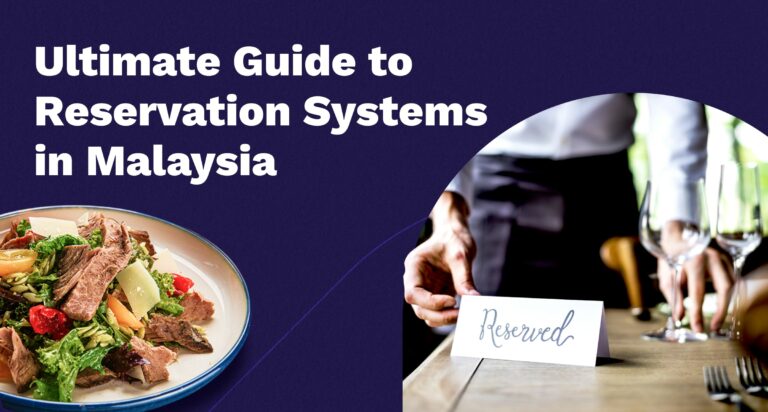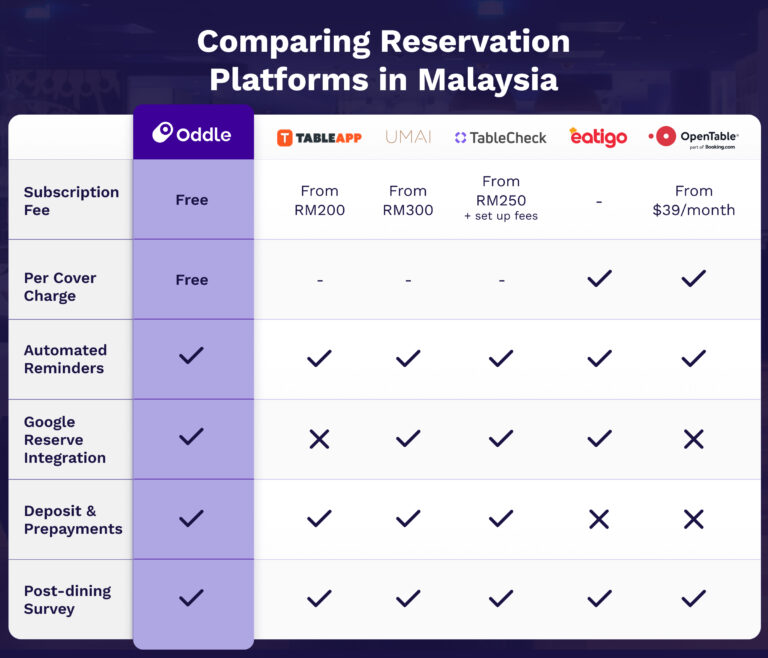Comparing the Best Reservation Systems in Malaysia
Key features to look out for, including deposits and data accessibility
As the devastating effects of the pandemic wane, the dine-in scene in Malaysia has been on the mend, with a positive outlook on the F&B industry on the whole. GlobalData has forecasted a compound annual growth rate (CAGR) of 8.9% for Malaysia’s foodservice sector, bringing the value of the market from MYR62.9bn in 2021 to MYR96.1bn in 2026. This is largely attributed to the rebound in consumer confidence and the resurging interest in dine-in experiences.
To cope with the rising demand, many F&B businesses have turned to restaurant reservation systems to automate their booking process.
The reservations market is a competitive one, and each platform comes with its own range of features and solutions. To better illustrate the key differences and similarities between the most popular platforms, we’ve put together a table to help you find the best reservation system in Malaysia for your needs.
1. The Best Reservation Systems Should Be Cost-effective
Most reservation systems in the market enforce per-cover charges or subscription fees just for getting people through the door. As shown in the table above, these fees start from RM200, and some even come with additional set-up costs.
Here at Oddle, however, our reservations system is available for free. We believe in working with F&B businesses as true revenue partners, keeping their costs low while providing them with the tools and expertise to drive their sales.
2. Accepting Reservations across Multiple Channels
When searching for new dining spots or information about a specific restaurant, the first instinct of most consumers would be to turn to Google. To facilitate quicker conversion, many reservation platforms are integrated with ‘Reserve with Google’, allowing restaurants to easily accept bookings from multiple channels like Google Search, Maps, and Assistant.
3. Reduce No-shows with Deposits and Pre-payments
While reservation platforms can help facilitate new customer acquisition, the resulting problem of no-shows is the bane of the F&B industry. Diners have a tendency to make several reservations for the same date and only turn up to one.
Oddle’s own CEO, Jonathan Lim, has spoken to CNA about the impact of restaurant no-shows: “besides lost revenue, restaurants must bear the cost of food preparation and extra manpower, and deal with the frustration of walk-in diners turned away.”
To reduce no-shows, many restaurants are turning to deposits or pre-payments. A 2021 interview by The Times in London observed that restaurant owners who did this observed a distinct improvement in their no-show rates.
On Oddle Reserve, variable deposits and pre-payments can be collected via the ‘Tickets’ function, which allows restaurants to introduce their exclusive dining events or special menus. Your special seating areas (eg. counter seats with a view of the kitchen or al fresco dining on the balcony) can also be highlighted via ‘Tickets’ for diners to make a reservation, thus transforming a simple meal out into a memorable experience.
4. Keep Diners Engaged with Automated Reminders & Surveys
A diner’s impression of your brand begins long before they set foot on your premises, and their first point of contact is often with your website or reservations platform.
Start off on the right foot by making their reservations journey as seamless as possible. Most major reservation platforms have features that send out automated confirmation emails and reminder SMS-es. Post-visit, follow up with ‘thank you’ messages or customer survey links to collect sentiment in order to improve your service.
With Oddle Reserve, restaurants will also be able to gain an all-in-one view of their customer database to run their own marketing campaigns and send regular e-newsletters to customers to encourage repeat visits.
Read more about the philosophy behind Oddle’s Free Reservations System here, or learn about How to Solve Supply & Demand Problems by making reservations a primary part of your sales strategy.
Kylie Wong
With a background exclusively focused on F&B, Kylie has worked with publications like Time Out Singapore, online restaurant Grain, and hospitality company The Lo & Behold Group. Her current interests include B2B Marketing & Content Strategy within the fast-growing food tech industry.



